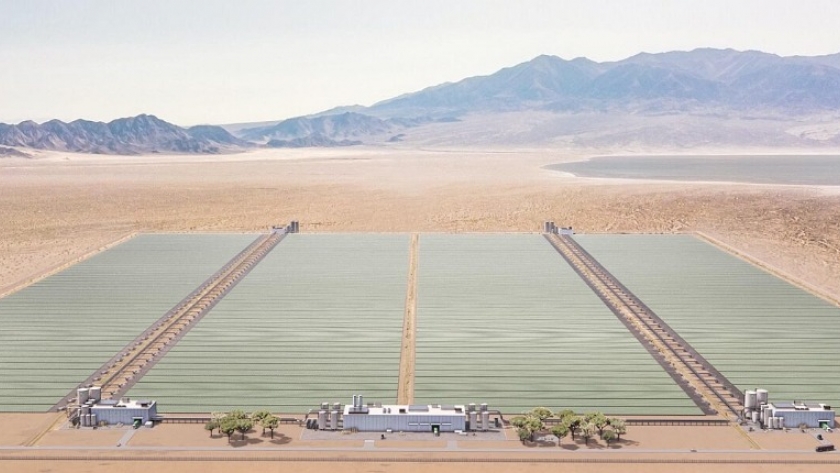
By Agroempresario.com
After decades of ambitious promises and high-profile failures in the microalgae industry, Anglo-Portuguese startup Arborea believes it has finally cracked the code. By developing a patented “biosolar leaf” technology that reinvents how microalgae is grown, Arborea is preparing to open the world’s first commercial-scale production plant of its kind in Portugal by 2027.
Founded by engineer and entrepreneur Julian Melchiorri, Arborea’s solution addresses the core limitations that have plagued microalgae ventures: high production costs, contamination risks, and poor scalability. Now, the startup claims its low-capex, modular system—powered by sunlight and atmospheric CO₂—can finally deliver on the long-touted potential of microalgae for sustainable food, feed, and biochemical ingredients.
Melchiorri, a trained engineer, spent over a decade studying the systemic failures of earlier microalgae companies like Joule Biotechnologies, Solazyme, and Synthetic Genomics. According to him, the problem wasn’t the microorganisms themselves—it was how they were grown.
“The industry focused too much on the biology, not enough on the system,” he tells AgFunderNews. “We knew we needed to solve the upstream challenges first—cost, contamination, consistency—if we wanted to enable a real photosynthetic microbial revolution.”
Arborea’s patented platform features gas-permeable membranes made from recycled plastic that absorb sunlight and atmospheric CO₂. This allows photosynthetic microalgae to convert carbon dioxide into organic biomass, releasing oxygen in a controlled, closed-loop system. Unlike traditional open ponds or tubular photobioreactors, which suffer from contamination and scalability issues, Arborea’s biosolar leaf delivers clean, consistent yields without costly inputs or high-pressure gas systems.
One of Arborea’s most compelling advantages is its capital efficiency. Melchiorri claims that his system’s capex is 10 times lower than conventional tubular photobioreactors. “This fundamentally shifts the economics of microalgae,” he explains. “It’s low-energy, modular, and highly scalable.”
From the outside, the system resembles a flat green solar panel—but inside, it features a sophisticated network of light-absorbing chambers where microalgae flourish under optimal conditions. The approach, he says, is both species-agnostic and contamination-free, opening doors to grow some of the most fragile and valuable algae strains.
“We’ve trialed over a dozen strains and managed to grow those that were previously considered too delicate,” he says. “That unlocks access to more than 30,000 species of photosynthetic microorganisms.”

For its first commercial application, Arborea is focusing on Arthrospira platensis—better known as spirulina—a high-protein cyanobacterium with a long history in health supplements. However, Arborea is using a proprietary strain that addresses one of spirulina’s main limitations: poor taste and insolubility.
“We’ve developed a water-soluble, neutral-tasting protein with clean color and excellent functionality,” says Dr. Kaly Chatakondu, Arborea’s global commercial director. “It foams, gels, and emulsifies, and has a complete amino acid profile.”
This positions it as a compelling alternative to traditional plant proteins, many of which require extensive processing or have undesirable flavors. Applications range from meat alternatives and beverages to sports nutrition and pet food.
Unlike sugar-based or gas fermentation systems—which rely on costly agricultural inputs or high-purity gases—Arborea’s platform uses only sunlight and ambient CO₂. “We are the first company in the world that can sequester CO₂ at atmospheric pressure and turn it into protein,” says Melchiorri.
This gives Arborea a powerful sustainability story. While sugar fermentation requires farmland and contributes to monoculture, Arborea’s system requires no arable land and can be installed on rooftops, deserts, or industrial zones.
“Our goal was to engineer a truly carbon-negative, cost-effective solution that doesn’t compete with food crops,” says Melchiorri. “This is what differentiates us.”
The new production plant in Portugal is expected to begin operations by 2027. Arborea has already raised €17 million ($20 million) in funding through a mix of public grants and private investment.
“We began the commercialization process earlier this year,” says Dr. Chatakondu. “We’ve already signed several Joint Development Agreements (JDAs) with multinational food companies and are in the process of securing more. These agreements will eventually convert into long-term offtake deals.”
In addition to food protein, Arborea is also developing natural blue pigments from spirulina—an ingredient increasingly sought after in clean-label food coloring. The firm is actively working with global partners to bring these pigments to market.
“There’s a lot of buzz right now about bioavailable vitamins and minerals too,” adds Chatakondu. “Spirulina is rich in both, and our process allows us to extract them in a highly absorbable form.”
Arborea’s bold approach suggests that the long-hyped microalgae sector may finally be ready for prime time. By solving the technical and economic hurdles that doomed previous ventures, the company is positioning itself as a leader in the next wave of sustainable biomanufacturing.
Melchiorri is clear-eyed about the journey ahead: “The technology works. The partnerships are forming. Now it’s about scaling and execution.”
If successful, Arborea’s biosolar leaf system could do more than disrupt food ingredients. It may offer a viable path toward large-scale carbon capture, urban air purification, and truly circular food systems.
